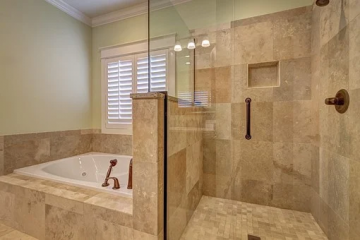 Granite tile flooring is one of the most used natural stone tiles by architects and interior designers around the world—second to its use in countertops.
Granite tile flooring is one of the most used natural stone tiles by architects and interior designers around the world—second to its use in countertops.
The Statue of Liberty stands on a granite base. Thanks to its durability, low porosity, and resistance to abuses and weather conditions. Its high-compressive strength makes it suitable for everything from load-bearing structures to cladding, flooring, and furniture.
Granite is perhaps the only natural stone available in thousands of colors. You can get the kind of shade, pattern, and texture you are looking for in a contemporary or traditional setting—no matter residential or commercial.  We are not going to explain the same benefits of granite flooring in more detail. Instead, we will try to cover other essential pros and cons of granite flooring that can serve you as the deciding factor.
We are not going to explain the same benefits of granite flooring in more detail. Instead, we will try to cover other essential pros and cons of granite flooring that can serve you as the deciding factor.
With over three decades of experience as a granite supplier, Quality Marble Exports (India) is unfolding first-hand experiences with you. Discover it to make an informed decision for a new construction project or remodeling!
Top 3 Pros of Granite Flooring
Ideal for Wet Areas

Not all types of flooring materials excel in wet areas. But granite is one such material that can withstand the pressures of a wet environment such as a bathroom or garden. Due to its impervious nature, it doesn’t allow moisture to damage your subfloor. It creates a layer (beneath the walkable flooring) that is practically impenetrable to liquids.
Not to mention, wiping up the standing liquids on the flooring to prevent slips is good. But even if you are not doing it immediately, the liquid will not harm your floor. But beware not to apply polished granite flooring in wet areas. Go only with the most suitable granite finishes.
Helpful for Someone Who Has Allergies
If anyone in your family has an allergy or asthma, granite for flooring could lessen their symptoms. Otherwise, you may also consider the options to prevent allergies. Granite is hypoallergenic in nature. This means that it is very less likely to support substances that cause allergic reactions.
As per Environmental Protection Agency (EPA), poor indoor air quality is a serious health concern. Living in such a house for a long time may increase the risks of respiratory diseases, heart problems, and cancer. Considering the point of view, granite can help in reducing allergic health conditions. The only thing you need to do is sweep and mop granite tile flooring every few days.
For instance, going with a lighter shade granite stone like Imperial White Granite is a thoughtful choice. You tend to notice dust and dirt easily which helps you in keeping the tiles tidy and clean always.
Available for Different Budgets
Although granite comes with a greater price tag than other flooring materials on the market, its long-term benefits prove it to be more cost-efficient. It will pay you back with increased beauty, longevity, and property value Granite for flooring comes in different grades. You can choose the one that fits your requirement and budget.
- Commercial Grade: This is the cheapest granite tile available. You will find simple plain colors with some noticeable flaws. The tiles are quite thin and require reinforcement during installation.
- Standard Granite: This one is thicker with fewer faults. Even the designs and colors are a bit more unique.
- Premium Grade: This is the highest grade stone with uniform thickness and flawless design. You will find most of the eye-catching colors, patterns, and textures under this category.
Explore a collection of premium grade granite stones here to understand the difference.
Top 3 Cons of Granite Flooring
Not Really for DIYers
Are you one of those who love taking up DIY home projects to reduce expenses? But granite tile flooring installation is not a DIY task. It is a time-consuming and labor-intensive process that requires skilled personnel. Also, it is a heavy stone so it requires expertise and accuracy in details.
Also, you will need a variety of power tools and other supplies. Some of these include drill machines, wet saws, sealants, grout, and mortar. Moreover, you need to check your subfloor for leveling before installation. Because granite tiles can lead to cracking on unlevelled subfloors. Last but not the least, proper sealing is an essential step to protect the flooring from moisture and microbes.
Feels Hard & Cold Underfoot
Due to high thermal conductivity, heat moves away from granite. While this feels refreshing in summers it feels uncomfortable in winters. And if you live in a geographical area where most of the months are cold, you might need to consider installing heat pads under granite flooring.
Also, due to its sturdy nature, the stone feels hard underfoot. And if you have a habit of wearing slippers at home, this won’t be a problem.
Not for Every Home
Granite is a heavy stone. So, before deciding to use it as flooring, you need to check whether your floor will support its weight or not.
And when you have kids or the elderly at home, you need to give extra attention to the kinds of finishes appropriate for the kitchen, bathroom, living room, and bedroom.
Quality Marble Exports (India) can help you with the right granite flooring solution for your home or office. Don’t hesitate to call us for a free consultation.









